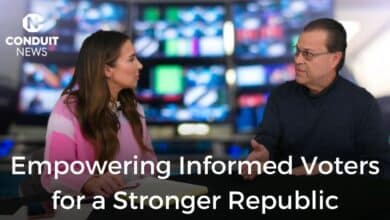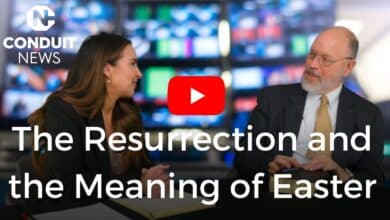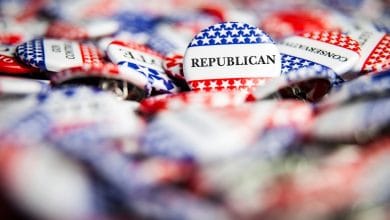Dr. Patrick Wolf, UofA Distinguished Professor of Education and Expert on School Choice, joins Conduit News to discuss why Arkansas politicians who oppose school choice are out of touch with both their constituents and the evidence.
Entire Transcript:
Ginny Lauren: My name is Ginny Lauren Dowden for Conduit News. And today we have Dr. Patrick Wolf joining us. As many of you know, he is a Distinguished Professor of Education Policy and an expert on School Choice. Hi. Thank you so much for being with us today.
Dr. Wolf: I’m delighted to be here, Ginny.
Ginny Lauren: It’s always wonderful to have you here in the Conduit Studio. We really appreciate all of the wonderful insight that you bring to the issue of school choice. This is such an important issue as it always is, but particularly here in 2022, we’re hearing it on a daily basis in the news. Talk to us about school choice. Why is this such an important issue now more than ever before?
Dr. Wolf: So school choice is a collection of policies that support parents in finding the best school for their child – public or private. And it also specifically focuses in on including private school options and providing support for families if a private school is the best choice for their child. So that can include initiatives like public charter schools and open enrollment on the public school side, but also school vouchers, tax credits, scholarships and education savings accounts on the private school side. And the whole point of school choice initiatives is to empower parents to be more involved in their child’s education, and specifically to have the opportunity and bear the responsibility to match their child with the school that’s going to deliver the best results for them.
Ginny Lauren: We are seeing a lot of parents call for more school choice. Arkansas has yet to answer that call, despite the fact that we have had a supermajority of Republicans in the Arkansas Legislature. I think a lot of parents are hoping that that can happen in the near future. One, why do you think that is still not happened? And then to talk to us about what that looks like…Governor Abbott recently called for school vouchers. Of course, Beto O’Rourke is saying, wait a second, that would actually defund the public school system. So talk to us about that. If that’s not true, debunk that, if you would, does it actually defund the public school system and why not?
Dr. Wolf: Sure. So back in 2000, my former colleague Jay Green, who’s now at the Heritage Foundation, developed an Education Freedom Index where he measured the amount of parental school choice available across all the states and the District of Columbia. So that was back in 2000. And again, that includes public school choice, public charter schools, private school choice and home school and Arkansas ranked 17th back in 2000 in education freedom.
We updated that index using data from 2016 and Arkansas had slipped to 26. So we were below average in education freedom while so many other states rocketed ahead of us in providing parents with support in choosing their child’s school. So we did lose ground over that 16 year period in terms of growing education freedom. Now I’m hoping when we have updated numbers we’ll start to catch up.
But states like Florida rocketed ahead of us and so we’ve definitely got work to do in terms of supporting school choice, especially private school choice. Now the question of defunding – how does private school choice work? Well, in Arkansas, like in many states, private school choice is supported by new funds that are made available that are channeled into the K-12 school system, specifically to support private schooling options for families.
So, the adequacy rules that govern the amount of money that district-run public schools are going to get, those are still in place. Those are not affected by private school choice and the local funding that’s raised through property taxes that all goes exclusively to district-run public schools, doesn’t go to public charter schools. It doesn’t go to private school choice programs.
So actually, what happens when students take advantage of private school choice programs and transfer from district run schools to the private school of their parents? Choosing what happens on the fiscal side is per pupil spending in the district schools goes up because they’re getting the same amount of money to educate fewer kids. Class sizes go down, more resources are available to concentrate on the kids who remain in the district run schools.
Ginny Lauren: So help us understand that. Is it a lack of information for those who are saying and school choice or school vouchers would de-fund these public school systems? Are they just not aware? Is it potentially fearmongering because it keeps these kids in the public school system? Well, what does that do? Who does that benefit? Potentially a particular base and school unions. Help us understand why that is such a strong talking point.
Dr. Wolf: Yeah, I mean, I think it’s a combination of the two points you made, disinformation and fearmongering and the disinformation feeds into the fear-mongering so people don’t fully understand how school finance works in states, including the state of Arkansas. And so they’re afraid actually, they assume that money follows the child. It really doesn’t. Or another way to put it is, is K-12 education funding is very sticky.
It tends to stick to institutions and doesn’t really travel with students as enrollments shift to various areas. So part of it is that misinformation and then that misinformation is transmitted into fear-mongering is that school choice is going to defund the public schools. Now, first of all, that doesn’t happen because of the way schools are funded.
Second of all, the easiest way for district-run public schools to preserve their funding is to be high quality schools and deliver results for parents because parents are very conservative. They have a philosophy in terms of their child’s education. If it ain’t broke, don’t fix it. You know, if everything’s going fine with their child in a district-run public school, they’re going to keep the child there. That’s the reasonable thing to do. So school choice is really only a threat to the district-run public schools that are ineffective and unresponsive to parents. There’s an easy fix for that– be more responsive to parents, deliver better results for the students and no one will want to leave.
Ginny Lauren: Right. You have said before — that let’s go back to politics — Arkansas politicians who oppose school choice are out of touch with both their constituents and the evidence. Explain that to our viewers.
Dr. Wolf: Yes, school choice is highly popular among the public. Nationally, about three quarters of adults support school choice, support government putting funds into the hands of parents so that they can select a private school for their child or construct a package of educational supports through an education savings account. So it’s wildly popular nationally it’s especially popular among African American families and among Republicans because it’s consistent with with the Republican philosophy of limited government and parental choice in education.
With the most recent polling, which is really interesting, is the exit polling from the Texas primary, Republican primary– 88% of Republicans who voted in the Texas primary said they support school choice. Now, Arkansans are like Texans in a lot of ways. I mean, we’re much more courteous and we play better football but aside from that, we’re a lot like Texans.
And so if 88% of Texas Republicans support school choice, it’s probably about the same in Arkansas. So it’s a very popular policy initiative nationally and in our state, and especially in the Republican Party. So anti- school choice Republicans should be an anomaly, right. That really shouldn’t be a policy position that Republicans are espousing.
Ginny Lauren: And those who will be in office again, perhaps those who have blocked legislation may want to reconsider that this time around. Also, you shared that recent polling data they overwhelmingly support school choice, which you mentioned, but also those states that have school choice students test numbers, their scores improve. Help us understand that.
Dr. Wolf: Yes. So going back to the Education Freedom Index, this measure of how much how easy it is for parents to exercise school choice across the various states. Basically, when we take that index of education freedom and we correlate it with gains in the National Assessment for Education Progress, that’s the nation’s report card that the federal government administers to a representative sample of students every year.
When we look at gains state level gains in student performance on the NAPE from 2000 to 2016, the states with more educational freedom saw better student gains on that test, so more freedom creates a competitive environment, so it facilitates two things, one – it puts pressure on schools, all kinds of schools to deliver good results for poor students.
And second, it allows parents to match their child with the school that’s the best fit for them. Those two forces result in better learning for students.
Ginny Lauren: And before we go, in the primary runoffs, we are seeing Republican candidates all still saying the same thing. Well, I’m for school choice…I believe that and something that you said earlier, that the money should follow the child. We see that a lot. But how can voters dig in and really understand what does this candidate mean when they say I’m for school choice?
And then, what bills or pieces of legislation have you seen nationally that you think would be a good fit for Arkansas moving forward?
Dr. Wolf: So to really be supportive of school choice you have to be in favor of sort of all options for parents and state policies that support parents in sending their child to whatever school is the best fit for them. A public school in a different district, but charter schools, a private school or support for homeschooling, whatever works best for the child.
So to fully be supportive of school choice, you have to support all those options. A lot of politicians who say they support school choice put limits on that support. They say, Yeah, but I don’t support school vouchers that allow parents to select a private school for their child or I don’t support homeschooling because that takes the kid completely out of the institutional school system or so they put limits on their school choice support that take options off the table for parents.
So to truly support school choice, you really have to allow parents to make that judgment and to have access to private schooling or home schooling if that’s the best option for their child. So what voters should do is they should whenever possible, press politicians on those specific school choice policies and also specific bills like the Philanthropic Investing Kids Act that was Senate Bill 680 in the 2021 session that passed and established a very small tax credit scholarship program in our state and so voters should ask their legislators and these candidates if they supported that initiative. It barely passed in the House with just 52 votes so it was a heavy lift and it’s just a very small pilot project for low income kids but that’s the best way for them to press politicians who advertise that they support school choice but don’t actually put their votes behind the initiatives that would help Arkansas parents have more options.
Ginny Lauren: OK and then I want to hear about legislation but I wanted to quickly ask you about this, too. There’s so much I want to talk to you about. Recent data came out that enrollment is dropped. It’s dropping in Arkansas public schools. We are especially seeing that here, particularly in the Fayetteville Public Schools and then in Central Arkansas around the Little Rock area. Why do you think that is?
Dr. Wolf: Well, the pandemic was a disaster for the public school system. I mean, you can easily liken the district run public school systems to a battleship. And it’s very hard to turn a battleship. And that’s what was required under the pandemic is schools have to pivot as quickly as possible and as effectively as possible from in-school instruction to remote instruction.
And, you know, the evidence is very strong that the public charter schools and private schools made that pivot much better. And that home schooling really exploded because a lot of parents said well, my child is home, anyway, I’m not satisfied with how this remote instruction is going. Why don’t I just teach them myself? Yeah. So homeschooling initially tripled during the pandemic.
Now it’s at a rate where it’s essentially doubled since 2019. So, a lot of families are sticking with it going forward. Private school enrollments are up slightly, and they have been trending down for a long time because basically with private schools, private schools are charging a fee for parents. So, they’ve got to be that much better than the free public schools and public charter schools that that that parents can get.
So, private school enrollments have been trended down for many decades and now they’re starting to trend back up again because parents are looking for options. They’re looking for a school that can swiftly and effectively respond to their child’s needs and to crises like a pandemic and charters and private schools really covered themselves in glory during the pandemic. And so I think the public school district run public schools are going to be severely challenged in regaining those lost enrollment.
Ginny Lauren: All right. Last question. I promise. Legislation, good bills out there that you would like to see move forward here in Arkansas regarding educational freedom.
Dr. Wolf: Well, let’s see. Virginia was the great hero of the 2021 legislative session regarding school choice. They enacted the first essentially universal private school choice program. It’s an education savings account. So it allows parents to customize their child’s education in a lot of ways. And everyone – every public school student in the state of West Virginia is eligible for it.
So that really is the gold standard now for school choice and Arkansas is a long ways from that. So, what I would expect to see, especially given that Republican candidates who strongly supported school choice did great in the recent primary in races that pitted a school choice supporter against a Republican opposed to school choice, the supporter won three quarters at the time.
So that’s a great victory record for school choice. So I think the 2023 legislature is going to be much more oriented toward expanding parental choice. I think we’ll see very exciting and ambitious private school choice proposals. I think we’re going to see proposals to expand public charter schooling in in constructive ways in our state because we could use more more public school options on the charter side.
So I think that’s what we’re going to see because parental choice and involvement in education is a huge issue that’s here to stay.
Ginny Lauren: Awesome insight. Thank you so much for coming in to Conduit. Anything else you want to add before we let you go?
Dr. Wolf: I think we covered all of it.
Ginny Lauren: All right. Thank you so much and hope to have you back in again soon.






